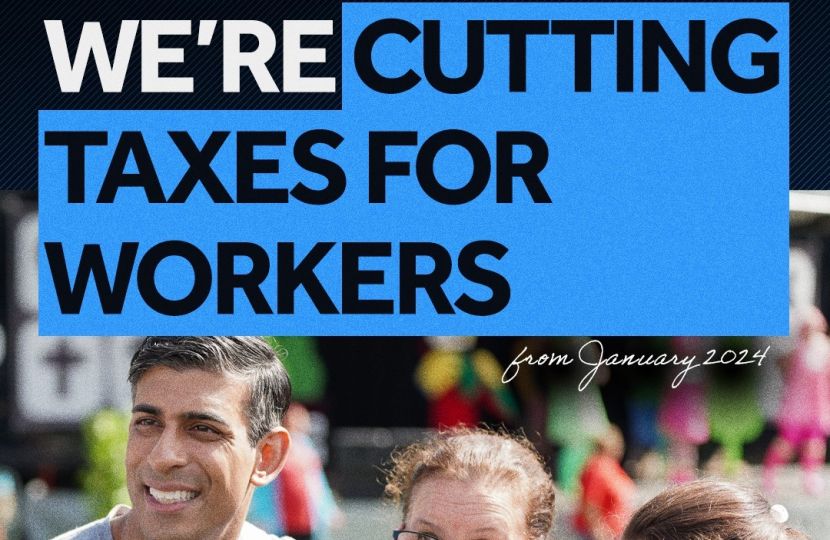
In his Autumn Statement today, the Chancellor of the Exchequer set out significant and wide-ranging measures to boost the economy, combining the biggest tax cut on investment in modern British history with the largest ever cut to workers National Insurance.
In January, the Prime Minister set out five priorities. Three of these were economic: to halve inflation, grow the economy, and reduce debt. Since then, inflation has been halved; the economy has recovered more quickly from the pandemic than anticipated; and debt is on track to fall.
Tough decisions have had to be made over the past year to achieve this, but the Government is now able to shift gear and focus on driving economic growth with the biggest package of tax cuts to be implemented since the 1980s – all while getting borrowing, debt and inflation falling.
The Chancellor confirmed the Government will:
Cut National Insurance Contributions (NICs) for 27 million working people from 12 per cent to 10 per cent, including 2.3 million workers in Yorkshire and the Humber. From January, this will save the average worker earning £35,000 a year about £450.
Cut and simplify tax for 2 million self-employed workers, abolishing an entire class of NICs and cutting the rate of the NICs top rate from 9 to 8 per cent – saving an average of £350 a year for someone earning £28,000 a year.
Cut business taxes by £11 billion – the biggest in modern times – by permanently enabling businesses to invest for less and offset investments against their tax bills. For ever pound a business invests its taxes are cut by up to 25p, generating £14 billion over the next five years.
Cut business rates by freezing the small business multiplier for a fourth consecutive year, benefiting one million businesses, and saving an average shop £1,650 next year.
Extend the Retail, Hospitality and Leisure Relief Scheme for a year, meaning 230,000 properties will share almost £2.4 billion in support. 21,000 businesses in Yorkshire and the Humber will benefit, with a typical independent pub keeping around £11,800 more; a café £5,700 more; and a cinema around £71,200 more.
Boost the National Living Wage (NLW) by nearly 10 percent to £11.44 an hour, benefitting 2.7 million workers, including 250,000 in Yorkshire and the Humber. A full-time worker on the NLW will see their pay increase by over £1,800.
Increase the Local Housing Allowance for 1.6 million families, with an average income boost of £800 for the most vulnerable in 2024/25. 67,000 families in Yorkshire and the Humber will benefit from this.
Protect the Triple Lock and increase pensions by 8.5 per cent, meaning the basic State Pension will be £3,750 higher than in 2010.
Freeze alcohol duty until August and so alleviate pressure on the hospitality sector.
Increase all working age benefits in full by 6.7 per cent, boosting benefit payments for around 5.5 million households by an average of £470 a year.
Provide further Cost of Living Payments to more than eight million households on eligible means-tested-benefits, eight million pensioner households and six million people on eligible disability benefits.
Reform welfare to get people into work and toughen up work requirements
Unlock 40,000 new homes over five years by investing £110 million in areas affected by ‘nutrient neutrality’ rules.
Reduce inflation further, with the Office for Budget Responsibility (OBR) stating that the package means inflation is forecast to be lower next year than anticipated at the Spring Budget.
Reduce debt, with the OBR forecasting debt will fall as a share of the economy a year early.
Reduce borrowing to its lowest level in over twenty years, at 1.1 per cent of GDP by 2028-29.
These measures, just some of the 110 announced by the Chancellor in his statement today, will help jumpstart the economy after a period of stabilisation following the pandemic, making the UK the best place to start and grow a business, and ensuring that people are able to keep more of their hard-earned money.
Julian Smith said, “I welcome the Chancellor’s statement today. Tough decisions have had to be made but, having driven down inflation and restored stability and confidence in the economy, now is the time to be bold.
“These measures will attract investment, encourage hard work, and deliver a boost to the economy - both in Skipton and Ripon and nationally - that will benefit everyone.”

